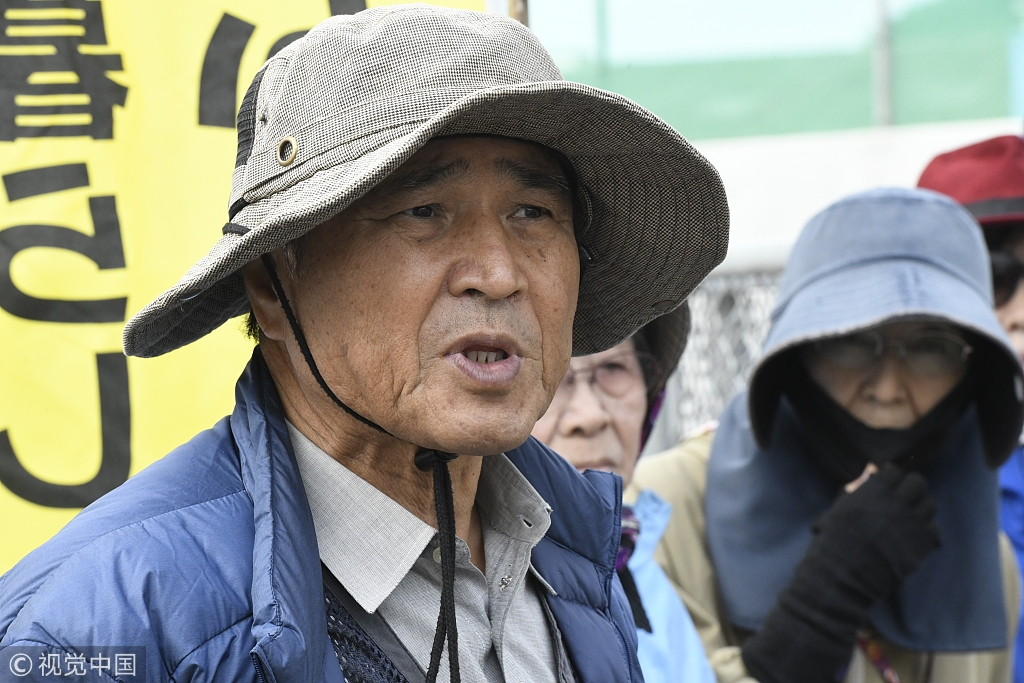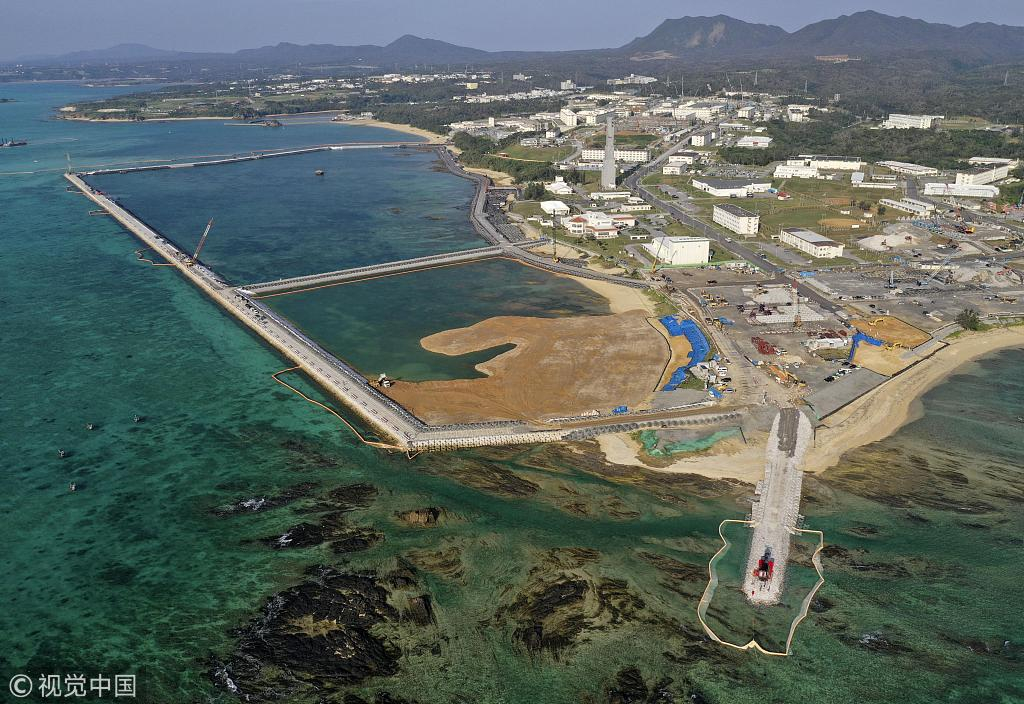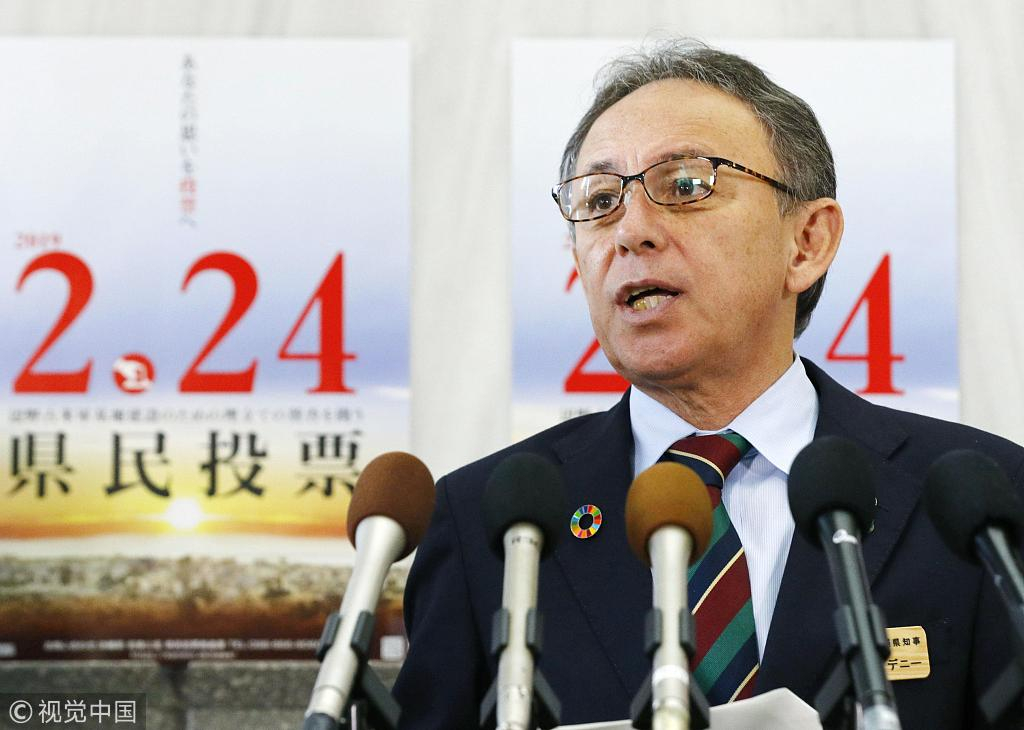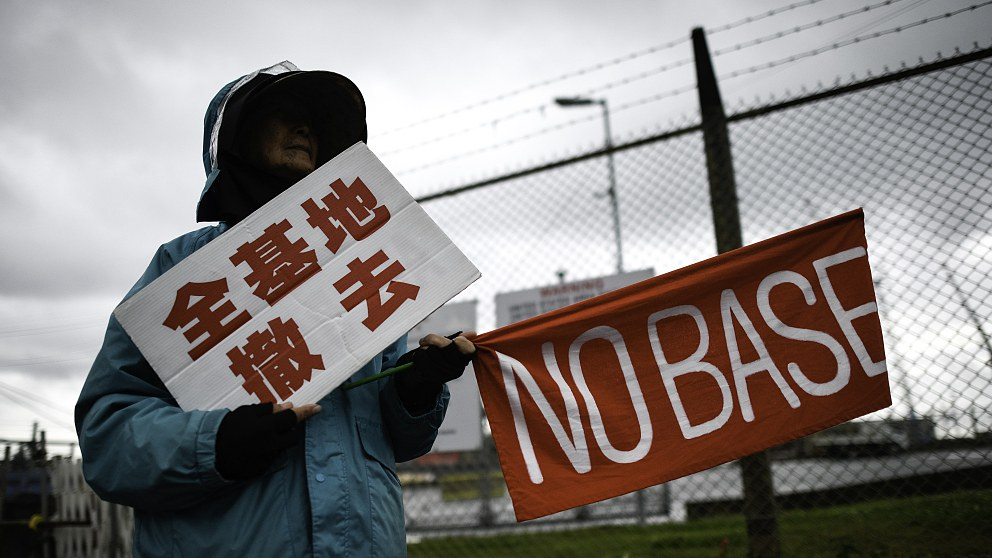Editor's note: Noah Wang is co-founder and chief marketing officer of TOP Network, a Silicon Valley-based tech firm developing a business-friendly public blockchain and the world's first blockchain-based cloud communication network. The article reflects the author's views, and not necessarily those of CGTN.
Residents of Okinawa, the southern island group in Japan plagued by a heavy U.S. military presence, are expected to voice their opinion on central government's controversial plan to relocate an American air base within the prefecture in a February 24 referendum: Don't do it.
The predictable NO
Predictions say that most residents will vote “no” in the upcoming referendum.
A Kyodo News poll conducted last week showed that 67.7 percent of local voters oppose transferring the Marine Corps Air Station Futenma, currently based in an urban area on Okinawa's main island, to a less populated region. The result is in line with a 2017 survey, where 74.1 percent of respondents said they objected to the relocation plan and support moving U.S. troops outside of the islands.
Close to China and the Democratic People's Republic of Korea (DPRK), Okinawa is strategically important to the U.S.-Japan alliance.
Around half of the roughly 50,000 U.S. troops in Japan are based in Okinawa, with American military facilities occupying about 15 percent of the land on the prefecture's main island, according to a Wall Street Journal report. Residents have complained that foreign forces bring noise, pollution, and crime, including the horrifying kidnapping and rape of a 12-year-old Okinawa girl by three U.S. servicemen in 1995.

Anti-U.S. base activist leader Hiroji Yamashiro gives a speech of his fellow protesters during a demonstration in front of the gate of Ryukyu Cement Co. pier on in Awa district of Nago, Okinawa prefecture, Japan, December 17, 2018. /VCG Photo
Anti-U.S. base activist leader Hiroji Yamashiro gives a speech of his fellow protesters during a demonstration in front of the gate of Ryukyu Cement Co. pier on in Awa district of Nago, Okinawa prefecture, Japan, December 17, 2018. /VCG Photo
The anti-base sentiment has been articulated by the election of Okinawa's current governor Denny Tamaki and his immediate predecessor Takeshi Onaga. Both have been outspoken in criticizing Prime Minister Abe's base removal proposal and demanding a scale back in foreign military installations on Okinawa.
Unlikely to reverse Abe's plan
Because the referendum is not legally binding, any anti-base sentiment will likely be marginalized, if not entirely neglected, by the central government.
First and foremost, it's improbable for the U.S. to agree to reduce its military presence in Japan amid escalating diplomatic uncertainties between America and the rest of the world. Despite Trump's previous claim of considering withdrawing oversea forces, military dominance in Asia can give the world's biggest economy a valuable negotiating chip in the intensified trade battles with China as well as the nuclear negotiation with the DPRK, so Washington will likely maintain, if not attempt, to ramp up its Japan-based troops.
If Tokyo pushes to kick American forces out of Japan, Trump, notorious for his aggressive tit-for-tat diplomatic moves even to America's allies, may immediately slap punitive tariffs on Japan-made products, a disastrous outcome for a country facing slowing economic growth.

Drone photo shows landfill work being undertaken by the Japanese government in the Henoko coastal area of Nago in Okinawa Prefecture for the planned relocation of U.S. Marine Corps Air Station Futenma, currently located in Ginowan in the southern island prefecture, February 14, 2019. /VCG Photo
Drone photo shows landfill work being undertaken by the Japanese government in the Henoko coastal area of Nago in Okinawa Prefecture for the planned relocation of U.S. Marine Corps Air Station Futenma, currently located in Ginowan in the southern island prefecture, February 14, 2019. /VCG Photo
With no way to reduce U.S. troops, relocating military installations seems to be the only option on the table for Tokyo, but still, Okinawa residents have little chance to get rid of Futenma station. No matter where it moves, the base can hardly cause more damage to the local economy and communities than in Okinawa. The prefecture accommodates little more than one percent of the total population and is among the poorest areas in Japan, according to the latest statistics released by the government.
For the Abe cabinet, who have to do the national-level math instead of focusing on local communities' well-being, bringing convenience to Okinawa at the expense of the economic and social equilibrium in a richer area does not balance the equation.
High turnout rate would make a difference
The prefectural referendum may not change Abe's national interest-driven decision to relocate the U.S. air base, but if the final ballot comes with a high voter turnout, the plebiscite could send ripples through Japan's political arena.
As the American military presence and its impact on Japan's national security become an increasingly prominent issue in the country's politics, the anti-U.S. base message from Okinawa residents, amplified by a good voter turnout, could prop up arguments from politicians who favor reducing reliance on U.S. troops and enhancing Japan's independent military strength.

Okinawa governor Denny Tamaki speaks to the press at the prefectural government office in Naha, February 14, 2019. /VCG Photo
Okinawa governor Denny Tamaki speaks to the press at the prefectural government office in Naha, February 14, 2019. /VCG Photo
High turnout is hard to achieve with the traditional voting system. On the one hand, elderly citizens, who are increasing in numbers in aging Japan, are unlikely to queue up for hours in front of voting booths due to health issues. A shocking portion of young Japanese has chosen to live isolated lives, making them reluctant to step out of their rooms to vote.
A possible solution is the block chain-powered online voting system. By allowing citizens to cast votes on computers or smartphones at home, the technology would eliminate inconveniences in paper-based voting and considerably boost voter turnout.
Blockchain prevents voter data from being tampered with or peeked at. Switzerland and the Japanese city Tsukuba have already launched programs to explore this cutting-edge voting technique. Hopefully one day it could help citizens like Okinawa residents to exercise their right to vote.
(If you want to contribute and have specific expertise, please contact us at opinions@cgtn.com.)





